Datasets on three strategic themes, finance, geography and statistics, are now available through one access point, in a machine-readable format, free of charge and ready for reuse by civil society, businesses, and the administration. Moreover, in time, they can be linked to other datasets on the semantic web.
With the launch of its national open data portal, Liechtenstein has reached a milestone in its open data journey. By making different types of government data freely accessible through one national portal, the country has improved the availability, accessibility and reusability of data generated by its public institutions. But the journey has only just started. For the first version of the portal, the country chose to focus on integrating datasets from the Office of Statistics, the Civil Engineering and Geoinformation Office, and the Financial Market Authority. These datasets were already openly available but not easy to find as they were hosted on separate portals. Now that the open data portal has been populated with these low-hanging fruits, the country has set the basis for becoming truly open by default and more data-driven. Data from other state offices and enterprises will gradually be added.
From a legal requirement to a strategic initiative
Liechtenstein has actively participated in the open data field for several years, beginning with releasing geographical data and collaborating with other German-speaking countries in the Open Government Data D-A-CH-LI initiative. Like other EEA countries, including Norway and Iceland, Liechtenstein experienced a significant boost in its open data efforts with the 2019 EU Open Data Directive. This directive served as a catalyst, pushing Liechtenstein to streamline and unify its open data activities. After incorporating the directive into national legislation, the Liechtenstein government partnered with Liip to establish a national data portal, moving from concept to go live in under a year.
Today, data users from Liechtenstein and beyond can access over 500 financial, geographical and statistical datasets through a single, unified portal. While no new data has been disclosed—all catalogued information was previously available as open data—this centralised catalogue now provides a single access point for users. The metadata has been standardised according to internationally recognised standards, enabling seamless data discovery and usability. Built on a linked data structure, the data catalogue allows the government of Liechtenstein to effortlessly add more datasets in the future and link them to the other datasets on the semantic web. Additionally, data providers are invited to work with the Opendata Coordination Office to develop options for automated data integration into the data portal and to consider aspects such as update frequency, data quality and data protection.
The portal currently hosts datasets from three publishers:
- Civil Engineering and Geoinformation Office: A collection of 43 geographical datasets, ranging from nature conservation areas and cycle paths to the building and housing register.
- Office of Statistics: A collection of 473 statistics datasets, ranging from historical voter turnout in referendums to citizenship, sex and municipality data about the resident and non-permanent resident population.
- Financial Market Authority (FMA): A collection of nine financial datasets, ranging from solvency capital ratio to return on equity of the banking sector.


The new portal's heart is the data catalogue. It enables a simple search and quick access to the desired data records through targeted filter options on categories, keywords, formats, and publishers, as well as an open search bar. However, what truly makes the portal stand out are the functionalities of the EntryScape solution on the backend. Based on open standards from the W3C standards body on Linked Data, EntryScape supports both human and machine users in the entire data management lifecycle, from import to access.
A human and machine-friendly solution for open data
The open-source solution EntryScape offers both user-friendly functionalities for public servants, providing data and capabilities for seamless automatic data integrations into other data portals or applications. It also provides a solid basis for becoming part of the semantic web. This solution brings several key benefits to the Liechtenstein and global data ecosystem:
-
User-Friendly Interface: The catalogue backend environment, designed with a low-tech approach, makes it easy for future data providers in Liechtenstein to create and manage metadata using EntryScape. Unlike traditional open data systems based on CKAN, no programming skills are required to add new datasets to the catalogue.
-
Standardised for Cross-Border Sharing: Built on international linked data standards, the portal enables seamless data sharing across borders. Liechtenstein’s data can be harvested by data portals in other countries, enhancing cross-border accessibility. Switzerland's national open data portal, opendata.swiss already features the data from its neighbour. Publication on the official European data portal, data.europa.eu is expected in the near future. For geodata, the portal uses the GeoDCAT-AP 3.0.0 in combination with Inspire metadata properties, while statistical and financial datasets adhere to DCAT-AP 2.0, ensuring interoperability with Swiss data systems. A planned upgrade to DCAT-AP 3.0 will align with updates in Swiss data standards.
-
Towards a 5-star open data ecosystem: Backed by EntryScape, the Liechtenstein metadata are captured in RDF-format, allowing them to be integrated in due time into an interconnected web of data, the semantic web. We would then speak of “Linked Open Data”. According to Tim Berners-Lee, the founding father of the web, publishing open data as linked data is the stage of open data maturity where both data publishers and consumers benefit most from the “network effect”. For publishers, data will be better discoverable and will increase in value. Data reusers can easily discover more related data and learn about the data schema. Following this logic, the Swiss Federal Government invests in a linked data infrastructure called LINDAS as the basis for a broader data ecosystem.
-
Open Source Commitment: In line with our core values, all code for the different modules used for the portal is shared on Bitbucket, aligning Liechtenstein with Swiss practices. Since January 2024, Switzerland’s Federal Law on the Use of Electronic Means for Government Tasks (EMBAG) has mandated open-source software for the federal administration.
Do you want to find out how to make linked open data work for your administration and constituents? Do not hesitate to contact me, I will be happy to discuss it with you.

